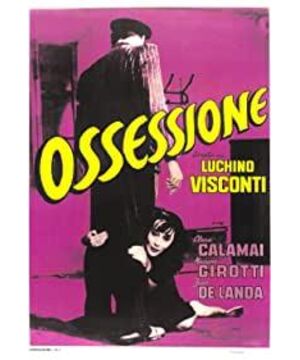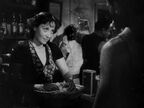As a representative work of Italian neorealism, Visconti changed from James Cain's noir novel "The Postman Always Rings Twice". Interestingly, when Visconti made this film, he did not buy the right to shoot it from Kane. In other words, this film is the least legal one in the "Postman" adaptation trilogy. Destiny catches people, as the "illegitimate child" of the original work, it is indeed the most famous one.
Visconti gave up the name of the original novel and gave the work an opportunity to rename it, called "Sinking". Although the change seems small, it also has a motive to avoid suspicion, but it also has a deeper meaning. The original title "The Postman Always Rings Twice" is a metaphorical title, but it has absolutely nothing to do with the content of the movie, and as an explanation, it means that the postman will always ring the bell twice in front of the door of the household when delivering letters to prevent the household from starting to fail. Hearing the doorbell, this kind of behavior with American characteristics, in the mainland of Italy, will definitely cause many people to misunderstand. Visconti named it "The Sinking", which literally means sinking into the water, falling to the bottom of the water. In the film, Visconti derives the signifier category of the word. First of all, the two murder scenes in the story are broken people under the car that fell into the river. Both murders are carried out by the same method, which is the so-called "postman always rings the bell twice" technique. Furthermore, the fall of the people in the movie, whether it is for profit or driven by lust, in the end, no one in the incident can be spared. In the end, it is the sinking of society, which creates an environment of misery for people. It is precisely because of poverty that people do whatever they can to survive and live better, and they are willing to sacrifice everything for this. This explains that Visconti's adaptation is a breakthrough. The original work focuses more on ethical criticism, while in Visconti's hands, he expands the motif, both of which lie in the problem of the motif. The difference in the way leads to a big difference between the film and the novel. Perhaps, this is the reason why Visconti did not negotiate with Kane about the adaptation rights. In his opinion, my film and Kane's novel, is a completely different work.
When it comes to Italian neorealism, it is reflected in the whole film, and the biggest feeling is "dirty". This does not just refer to the visual "dirty". This "dirty" is everywhere. The display on the streets and the streets and the hard work of the people under the Mussolini regime has a very strong political reference, but he is not divorced from the plot, but is also brought out by the bottom people of the working class, Jino. . The towns shown in the movie also subjectively strengthened the barrenness of the people because of Kino's confused mentality. But this is not one-sided. In it, having fun in the midst of suffering is a good way to show the people's tenacity. Life is by no means one-sided. Singing and dancing is the hope for the future, and the work will not be caused by a monotonous emotion. lose authenticity. The common people can live a difficult life, and the towns are also "dirty". At the same time, among the main characters, the emphasis is on the sinking of people. The sinking lies in the pursuit of desire. For this reason, they will do anything to achieve this. From the beginning of the encounter between the homeless child and the bar owner, because of this relationship, the two will drag the other into doom. This is not only about the "despicable" identities of the two with the momentum that can take anyone off the horse, but also about the special settings for the classic "femme beauty". If you only look at the result, the boss lady must be a devil who is heinous, but the entanglement of the process and her pursuit of love have diluted her evil, and the ending is also unbearable. The wanderer Jino seems to be a character who was accidentally involved, but she can turn the boss away and flirt with the barmaid, always taking the opportunity to wipe the oil of the people around her with her unclean hands (the practice of thieves), so that he has never been a kind person, It's just that his own small evil, driven by the "femme beauty", contributed to his "big evil", which turned from ethical immorality to murder that violated the law. One murder (intentional) for the heroine and the second murder (accidental) for the male lead, "The Postman Always Rings Twice" is perfectly constructed. However, at the end of the ending, at the crime scene, Gino should be given more time to express his emotions, so as to strengthen the lyrical meaning of the work. Unfortunately, perhaps due to the influence of the "white phone film" at that time, he couldn't let go of his hands and feet. , which led to the hasty handling of the ending, and the "dirty" of human nature was punished by the law, and it felt inappropriate to think about it. The main characters in the movie, the relationship between the three, the arrest of the third party, and the murder of the husband and wife are all because the husband thinks that the slut is capable, the quality and the price are cheap, and the wife is difficult to get along with the husband because of the husband's money, and the husband often Beating his wife, just to vent the dissatisfaction of life. The swinger stays because of lust, and that's the nature of it.
Having said that, as the pioneering work of Italian neorealism, it is impossible not to mention the declaration of "carrying the camera on the street" at that time. The effect of this film is to show the lyrical environment of the environment. We can see that in this film, there is a similar treatment method in inheriting the fit of the characters' psychology and environmental expression in the later period of French poetic realism. In the depiction of the city circus, there is a lot of troubadour music, Italian opera, jazz minor as the background music of the scene, analysis, troubadour music can represent the wandering of Gino; Italian opera can be regarded as the tradition of bar owners It is the embodiment of masculinity and machismo; the jazz minor comes from the United States, so the proprietress's "femme beauty" attribute is also sublimated by the music. However, these three pieces of music are all placed in the live sound, and they are not obtrusive. Visconti only uses music to assume the function of character characterization in the process of the work, and subconsciously influences the audience to have a better stereotype for the character. Speaking of scenes, the public scenes in the works are very lively. This underscores the Italian common people's ability to make fun of themselves (mentioned above), and the clutter of the panorama (with countless faces squeezed out of the front, middle, and back) reinforces the concept, but they are all onlookers, It is not the person involved in the incident. Whether this can be regarded as a criticism is a matter of opinion. The best environmental treatment is still in the segment where the proprietress Kina and Kino confess to each other. The vast beach and wilderness signify that their future is open. They let go of their past selfish behaviors and misunderstandings and run away for love. It's a pity that they all forgot that they were forced into a corner and finally chose each other. The final "Hand of God" created an accidental "murder" that shattered this beautiful and false dream.
Visconti's "The Sinking" is poignant and emotional. After the work fits the feature of "cameras on the street", it is added to the re-creation of James Cain's noir novels; although it does not completely get rid of the nature of literary films, it has also disappeared under the drastic adaptation efforts. Some flaws in the movie. In the space that gives a lot of lyrical meaning, the narrative of the film is not affected at all. In the environment of single-line narrative structure, narrative and lyricism are closely combined. If the movie is like a long narrative poem, I think Visconti's "The Sinking" can probably play a qualitative role.
View more about Obsession reviews







